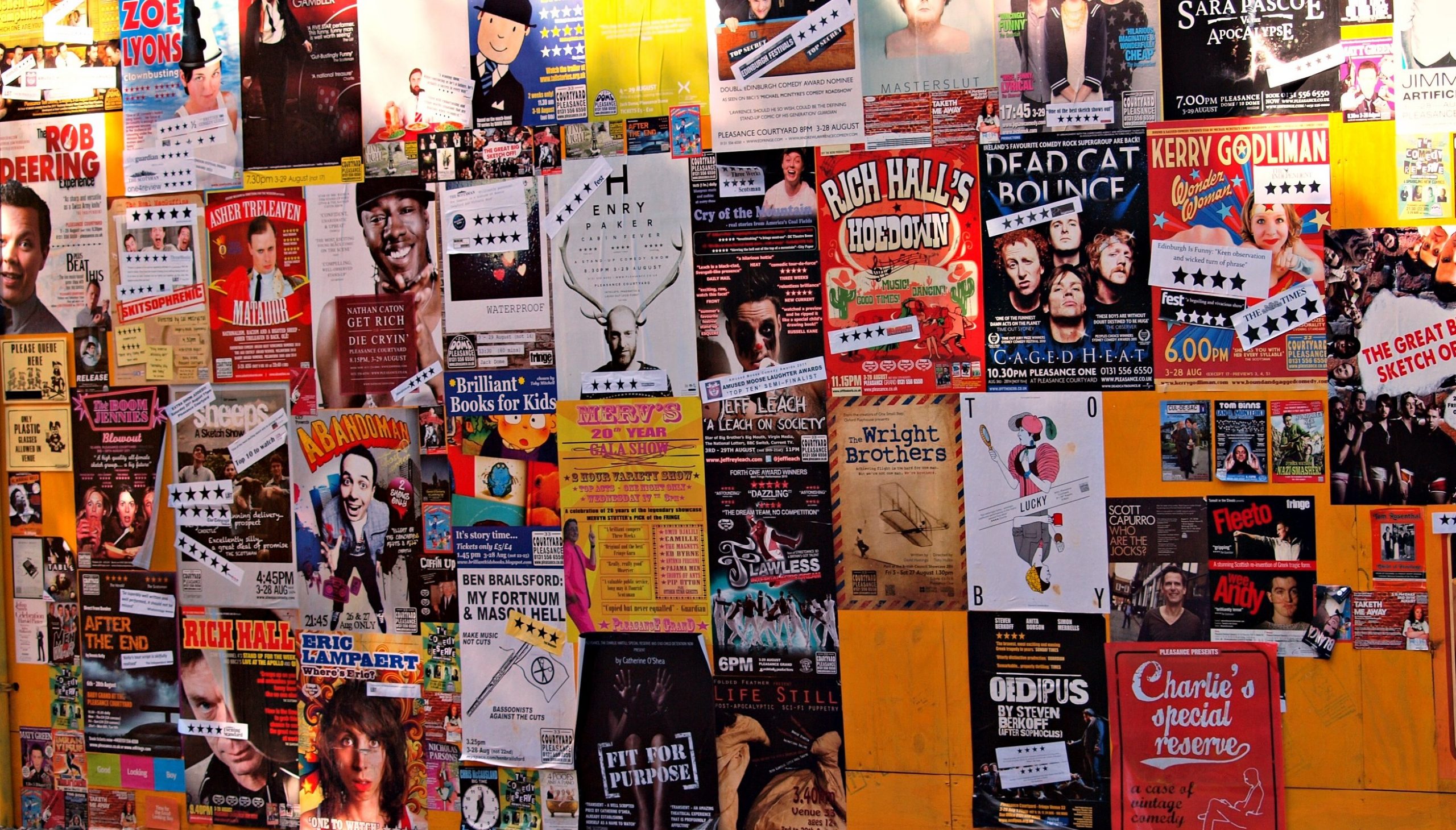Decades before two Wired editors famously coined the term crowdsourcing as the trend-setting buzzword of 2005 and beyond, offline peer production came to define contemporary theatre through the Edinburgh Festival Fringe, the alternative arts juggernaut that rips through the Scottish capital every August. What started as an unwelcome band of theatre companies defying convention spawned into the single largest festival of its kind, and in so doing exported a new genre of eccentricity in performing arts. To this day, hundreds of non-ticketed free shows still line the periphery of the festival.
By design, the Fringe was built without theme or governing body. Any artist willing to secure a venue is welcome, there is no oversight or curation of show times, and – distinctively – there are no winners. The model begets an air of excitement with the prospect of tapping into accidental genius. For the festival hopeful, what stands to be gained from the infamously exorbitant pay-to-play costs now associated with the event is international publicity and the chance to be discovered. With so much plasticity baked into the ethos of this uniquely laissez-fare approach to theatre, genres tend to swing – widely. However, this year, an ad hoc theme has in fact appeared on the Fringe performance circuit, and in step with long-held complaints of corporate gentrification; politicking.
A recent study by the non-profit SIT-UP Awards, whose aim is to bring greater awareness to social causes through theatre, points to a growing trend in which social issues account for nearly a quarter of programing. Of 966 bookings, analysis identifies mental health as the topic of chief concern with 42, followed by women in society at 29, and the #MeToo campaign at 11. But what are these artists supporting? Do productions that address social issues have real impact with their content choice, or are they instead dovetailing from the rebellious spirit of the Fringe to capitalise on a familiar hashtag and pander to corporate branding?
With the possibility of celebrity status, there is an obvious incentive for artists to align themselves with topics that might provoke emotional outpouring, but with such diversity and scale, it also casts the Fringe as an emerging platform for crowdsourcing in politics. To understand this current trend, it’s worth exploring both the origins of the Fringe and consider the future of the festival.
The Fringe itself began as a bandwagon addition to a larger enterprise. After the Edinburgh International Festival denied Scottish drama representation in what was then billed as a programmatic reemergence of Scottish high society post World War II, a group of likeminded Scots arose on the, well, fringe of the festival site. Their goal was to siphon attention from the swelling crowd of patrons and media gathered for the official event by performing in unsanctioned proximity to the juried festival. That was 1947. Today, the festival has reached stratospheric heights in participation and has decidedly graduated from its anti-commercial, anti-establishment origins. Conversely, commercialisation has arrived in its stead to the drumbeat of sponsorship money, quid pro quo journalism, advertising fees, grease palming promoters, and the monopolisation of a few select venues. The cost of admission is now so high as to be almost prohibitive, albeit reflective of the social mobility crisis damning Britain’s poor.
In addition, sheer logistics cripple the city with dizzying census statistics. In 2017, over 3,000 shows took place across 300 venues, in effect causing the population to balloon from a resting 500,000 to over 1 million, overwhelmingly residing in the historic Old Town and City Centre. The city becomes a gridlocked mass, leaving residents and performers alike to lament the festival bloat and wistfully mourn the grass root spontaneity of years past. If trends in Fringe commercialisation now extend to social causes as the SIT-UP Awards study would suggest, we run the risk of commodifying, even trivialising, genuine problems like sexual assault and mental health, which are en vogue this year. Still, perhaps what redemption may be salvaged from a movement that has both outdone and outgrown itself rests with the very creator of the behemoth; the people.
Reason would suggest that whatever political awareness generated through the staging of a play or artistic performance at an international festival as eminent and broadcasted as the Fringe should be lauded as an altruistic pursuit in public good. However, not unlike any shade of pink coming to support breast cancer research, taking on social issues at an arts festival results in splintering and washed-out messaging, thus weakening any political posturing or unified call to action. Furthermore, performances at the Fringe are inherently taken as entertainment within a celebratory, party-like atmosphere. For serious strides in advancement, festival goers should critically study emergent trends underlying the commercial nature of the Fringe and make any donation or decision in wake of their thoughtfulness.
Image: zoetnet via Flickr

